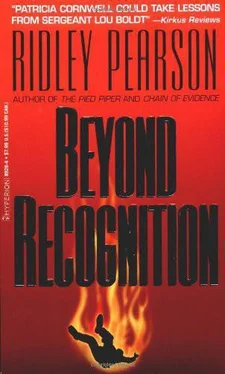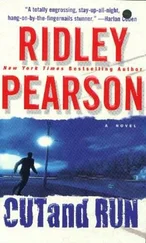Ridley Pearson - Beyond Recognition
Здесь есть возможность читать онлайн «Ridley Pearson - Beyond Recognition» весь текст электронной книги совершенно бесплатно (целиком полную версию без сокращений). В некоторых случаях можно слушать аудио, скачать через торрент в формате fb2 и присутствует краткое содержание. Жанр: Триллер, на английском языке. Описание произведения, (предисловие) а так же отзывы посетителей доступны на портале библиотеки ЛибКат.
- Название:Beyond Recognition
- Автор:
- Жанр:
- Год:неизвестен
- ISBN:нет данных
- Рейтинг книги:5 / 5. Голосов: 1
-
Избранное:Добавить в избранное
- Отзывы:
-
Ваша оценка:
- 100
- 1
- 2
- 3
- 4
- 5
Beyond Recognition: краткое содержание, описание и аннотация
Предлагаем к чтению аннотацию, описание, краткое содержание или предисловие (зависит от того, что написал сам автор книги «Beyond Recognition»). Если вы не нашли необходимую информацию о книге — напишите в комментариях, мы постараемся отыскать её.
Beyond Recognition — читать онлайн бесплатно полную книгу (весь текст) целиком
Ниже представлен текст книги, разбитый по страницам. Система сохранения места последней прочитанной страницы, позволяет с удобством читать онлайн бесплатно книгу «Beyond Recognition», без необходимости каждый раз заново искать на чём Вы остановились. Поставьте закладку, и сможете в любой момент перейти на страницу, на которой закончили чтение.
Интервал:
Закладка:
“You’re giving me gooseflesh, Mr. Garman,” Boldt said.
“Scares the fool out of me,” he repeated. “Want to know why? Lemme ask you this: Does a guy light off two, three, four test fires-does he take all that risk-just to get Dorothy Enwright perfect?”
“Does he?”
“No way. It’s too risky. One fire, maybe. But four? Six?”
“What exactly are you saying?”
Garman reached into his shirt pocket and withdrew an opened envelope. He placed it before Boldt, who elected not to touch it. The address, written in blue ballpoint ink, was scripted in poorly formed block letters.
“You’ve handled this?” Boldt asked.
“Yes.”
“Anyone else?”
“No. I’ve haven’t shown it to anyone.”
Boldt found a pencil and expertly maneuvered the envelope to face him, curious but at the same time reluctant. “Why me? Why now?” he asked.
Hearing the question clearly troubled Garman, and Boldt sensed he had prepared himself for the answer ahead of time. “How many of these do we all get? You get them, I get them. Quacks. Freaks. Tripsters. Former squirrels we’re not using any longer. Most of them end up in the can. I got a whole series from a woman once, following a TV interview I did. First one was a sexy letter. Second one was another letter and a photo. Third, was a letter and another photo, this time with her shirt off. By the fifth, she was stark naked on a bed, and I mean rude. The sixth, there wasn’t any letter, just a video. That was the last one. They stopped coming after that.” Garman wiped some perspiration off his upper lip. It wasn’t hot on the fifth floor, not compared to summer. “So, something like this comes, you file it under freak. But it arrived the day of the Enwright fire-addressed to my home, not my office.”
“You brought it with you today to the meeting but elected not to show it,” Boldt reminded the man. “Why?”
“I’m showing it to you now.” Garman had naturally red cheeks and a big smile when he allowed it.
“Why show it to me and not your colleagues?” Boldt asked.
“Those guys? I’m one of those guys. I know how they think. We investigate fires, Sergeant. They would have laughed me out of that room. This,” he said, indicating the envelope, “maybe it’s something, maybe it’s not. But it’s your thing, not mine, not those guys. If it means anything at all, you’re the guy for it.”
“Am I really?” Boldt didn’t want the letter. He didn’t want the case any longer. Too many guys between him and the evidence, too much he didn’t know about and would have to learn. He realized that if the body was subtracted from the case, it wasn’t his. He briefly resented Dorothy Elaine Enwright.
Seeming to sense this, Garman said, “Listen, it’s just a bunch of nonsense. That’s the other reason. It’s not a threat or anything. But it’s off the wall. Some plastic and a poem. So what? And then I’m thinking maybe it means something. Those stains on the envelope? I threw the thing out. It was in the trash for three days. I only fished it out this morning before the meeting, because it occurred to me the dates were the same.”
“It’s mailed from Capitol Hill,” Boldt said.
“Yeah, I saw that too.”
Using a pencil’s eraser, Boldt carefully opened the back flap. He hoisted the envelope with the pencil and dumped out its contents. An unremarkable blob of what appeared to be melted green plastic slid out onto the desk’s surface. It was about the size of a poker chip.
Using a second pencil, Boldt extracted and unfolded the note. His eyes fell to the crude drawing of a small headless man climbing a ladder. Boldt could imagine the figure a fireman. The fact that it lacked a head would require the interpretation of the department’s psychologist, Daphne Matthews. Alongside, in the same undeveloped handwriting as on the envelope, was written, He has half the deed done, who has made a beginning .
After an excruciating silence, Boldt looked up at the big man sitting next to him and said dryly, “I don’t like this.”
“No,” said the other. “I know what you mean.”
5
The psych profile was ready on Friday.
Daphne Matthews, the department’s psychologist, notified Boldt by leaving a message on a piece of notepaper, accompanied by her trademark doodle of a smiling bird.
Sight of her still stopped Boldt’s breath. Some things never changed. He wondered if it was because of her thick mane of chestnut-brown hair or the narrow face with the sharp features. Perhaps the slender body, the dark skin, and long fingers. She was a woman who could play a set a tennis, talk a suicide out of a window, or hold a press conference where no one shouted. Maybe it was those lips, red, pouty, that just had to taste sweet, had to be softer than warm butter. Her clothes helped. She wore smart clothes, not high fashion. On the morning of September twentieth, it was khakis, a hunter-green plaid shirt that she filled out deliciously, and a silver necklace with a jumping porpoise leaping below her collarbone.
On her desk, a small plastic Charlie Brown held a sign that read THE DOCTOR IS IN -5 CENTS. A teapot with a twisting vine of soft blue flowers sat on a coaster next to a pile of multicolored file folders. Her ninth-floor office was the only one in the entire building that didn’t smell of commercial disinfectant and didn’t feel like something built by a city government. She had real curtains covering her window, and the poster art on the walls reflected her love of English landscapes and Impressionists. She had a red ceramic lamp with brass handles on the opposite corner from the phone. Vivaldi played from a small boom box on the shelf behind her. She turned down the music, pivoting in her chair, and smiled. The room seemed a little brighter.
In the small stack of files were problems common to the department: the officer-involved drunken brawl at a downtown hotel that erupted after two of the men had entered the hotel pool, after hours and stark naked; the attempted suicide by a narcotics officer that followed the near fatal beating of his ex-wife; the evaluations of several officers in drug and alcohol rehab; a few repeat offenders; a few who couldn’t sleep anymore; and some others who slept too much, burdened by depression.
Daphne Matthews was referred to as the staff shrink. She attempted to paste back together the cops who fell apart. She listened to those who needed an ear. She created psychological profiles of suspects based on whatever she could find.
She poured him tea without asking, putting in one sugar and enough milk to make it blond. She stirred it and handed it across the desk. She didn’t ask why he was here-there were too many years between them for such formalities. “The green plastic in the envelope mailed to Steven Garman? I don’t know what it means. Money? Jealousy? Death? None of the above?”
“The verse?” he asked.
“ He has half the deed done, who has made a beginning . It’s from a poem by Horace. Quintus Horatius Flaccus. Born in the century before Christ. Major influence on English poetry. One of the greatest lyric poets. Heady stuff. Our boy knows his literature. College educated, maybe a master’s. It’s either a cry for help or a threat.”
“Our boy?” Boldt asked. “The killer? You think so?”
“We play it that way, don’t we?” she said. “At least until you hand me someone different. The sketch is of a headless fireman going up a ladder. It talks about a deed being done.”
“A confession?” Boldt asked, his heart beating strongly in his chest.
“More of a warning, I think. He warned Steven Garman; it allows him to disassociate from the consequences of the fire.”
Читать дальшеИнтервал:
Закладка:
Похожие книги на «Beyond Recognition»
Представляем Вашему вниманию похожие книги на «Beyond Recognition» списком для выбора. Мы отобрали схожую по названию и смыслу литературу в надежде предоставить читателям больше вариантов отыскать новые, интересные, ещё непрочитанные произведения.
Обсуждение, отзывы о книге «Beyond Recognition» и просто собственные мнения читателей. Оставьте ваши комментарии, напишите, что Вы думаете о произведении, его смысле или главных героях. Укажите что конкретно понравилось, а что нет, и почему Вы так считаете.












